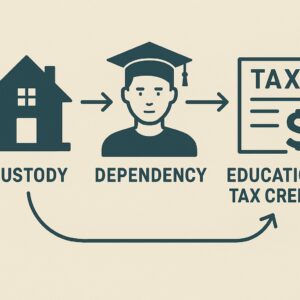If you share custody of a college or trade‑school student, taxes can get tense fast. The key is simple: education tax credits follow the person who claims the student as a dependent. That’s the rule that decides who claims the credit. Below is a straightforward way to keep things fair, compliant, and calm at tax time—brought to you with guidance inspired by the practical approach of Evans Family Law Group.
Custody, Dependency, and Who Claims the Credit
Start with dependency. The taxpayer who claims the student as a dependent is generally the only one who can claim the American Opportunity Credit or the Lifetime Learning Credit.
Custody affects dependency. The custodial parent is the one the student lived with for more nights during the year. That status usually controls who can claim the dependent unless there’s a valid release.
Here’s the rule of thumb: dependency drives the credit. Who paid tuition usually doesn’t decide who claims the credit. If you don’t claim the dependent, you generally can’t claim the AOTC or LLC.
AOTC vs. LLC in Plain Terms
The American Opportunity Credit is for the first four years of undergraduate study. It can be partially refundable and often delivers the bigger benefit.
The Lifetime Learning Credit is more flexible. It works for undergraduate, graduate, and job‑skill courses. It’s nonrefundable, but it can still lower the tax bill.
You can’t double‑dip. Only one credit per student per year. And income limits and filing status rules apply.
Form 8332: How a Noncustodial Parent Can Claim
A divorce decree isn’t enough for the IRS. If the noncustodial parent will claim the student, they usually need Form 8332 (or a similar written release) signed by the custodial parent.
Form 8332 transfers the right to claim the child as a dependent for that tax year. That lets the noncustodial parent claim the AOTC or LLC if other rules are met.
What it doesn’t transfer: head of household status, the earned income tax credit, or child‑related credits tied to residency. It’s focused on the child’s dependency. Keep signed forms for your records and attach as required.
Alternating Years and Who Paid Tuition
Many agreements say you’ll alternate years. That can work, but you must coordinate the paperwork. In the noncustodial parent’s year, the custodial parent should provide Form 8332 for that year.
Who paid the tuition doesn’t control who claims the credit. If you paid the bill but didn’t claim the dependent and don’t have a valid release, you likely can’t claim the credit. Plan so payment timing and documents match your alternating‑year plan.
When the Student Files Their Own Return
If no one claims the student as a dependent, the student may claim an education credit on their own return if eligible. That can make sense in some cases.
Caution for under‑24 students: special support rules apply to the AOTC. If the student is under age 24, a full‑time student, and did not provide more than half of their own support, they can’t get the refundable part of the AOTC. The LLC is still possible if otherwise eligible. Run the numbers before you decide.
A Practical Checklist to Avoid Conflicts
- Decide early who will claim the dependent for the year.
- If the noncustodial parent will claim, have them sign and date Form 8332 for that year.
- Share the 1098‑T from the school and any updated versions.
- Swap receipts for tuition, fees, and required course materials.
- Check income limits and filing status before filing.
- Align your divorce decree with IRS rules; the decree alone isn’t enough.
- Set calendar reminders for tuition payments and document deadlines.
- Confirm whether the student will file independently.
- E‑file early to prevent duplicate claims and IRS rejects.
- If stuck, consult a tax pro to model the best after‑tax result.
The Bottom Line
When it comes to education tax credits, custody influences dependency, and dependency decides who claims the credit. Keep the focus on who can claim the student, coordinate Form 8332 when needed, and match your documents to your plan. Clear communication now prevents headaches later. If you need help aligning your parenting plan with tax rules, a family‑law‑plus‑tax‑aware team like Evans Family Law Group can help you set up a system that works year after year.
